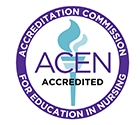Summary
NU 304 Health Assessment
Main Content
This course teaches the student to assess the health status of clients of any age in any setting. Students incorporate knowledge attained in the prerequisite courses, Introductory and Developmental Psychology, Sociology, Anatomy and Physiology, Chemistry, and Microbiology. The student learns verbal and non-verbal communication techniques used in obtaining a health history and the written communication techniques used in documenting the health assessment. Students acquire the basic psychomotor skills of inspection, palpation, percussion, and auscultation necessary when performing a physical examination. The effects of age, gender, culture, religion, socioeconomic status, lifestyle, and adaptation are identified.
Summary
NU 403 Evidence for Nursing Practice
Main Content
This course focuses on the translation of current evidence into nursing practice, including the identification of practice issues, appraisal and integration of evidence, and the evaluation of outcomes (AACN, 2008). Students develop the skills necessary for understanding, evaluating, and applying evidence in transforming nursing practice. Activities include in-depth study of the research process as it relates to the critique and evaluation of research, the synthesis of nursing research in the development of a review of the literature, and the dissemination of research findings.
Summary
NU 404 Concepts and Challenges in Professional Practice
Main Content
This is an introductory course to explore the role of the professional nurse in the ever-changing healthcare system with a view to empowering and solidifying that role. Students explore the challenges and opportunities inherent in professional nursing including but not limited to advances in nursing practice and role development, the increased use of technology in practice, ethics and legal issues in practice, concepts critical to leadership, interdisciplinary collaboration and systems thinking, and the increasing role of theory and research in advancing the profession and providing quality, safe patient care. Activities include values clarification, portfolio development, seminar leadership, group activities, and/or online discussions.
Summary
NU 510 Community-Based Nursing
Main Content
The role of the professional nurse in the primary level of health care is explored. Using client models, students implement the nursing process and adaptation model to plan therapeutic nursing interventions for individuals, families, and groups in a variety of community settings. In addition, the course will focus on community assessment, communication, critical thinking and decision-making skills, teaching, epidemiology, research utilization, group process, and other strategies used in community health. Students will develop competence in a clinical practice setting. Prerequisites: NU 304 and NU 403
Summary
NU 601 Nursing Theory
Main Content
This course focuses on the historical development of theory from the perspective of nursing science. Nursing theory and its relationship to research and evidenced-based nursing practice, as well as approaches to theory construction are explored. Students will analyze selected concepts, the building blocks of theories. Students will critique specific nursing theories in relation to their own belief systems, examining the concepts of the major paradigms within the discipline of nursing as well as other human science disciplines. Early "grand nursing theories" and "mid-range nursing theories" more recently developed will be evaluated. Emphasis will be on understanding individual nursing theories and borrowed theories from other disciplines and their application to nursing practice, nursing research, nursing leadership, and nursing education.
Summary
NU 605 Concepts in Nurse Leadership
Main Content
This course focuses on issues of leadership role development in professional nursing. Using role theory, students will explore concepts of role mastery, congruence and conflict as well as the role of nursing leadership in the broader organizational context. Emphasis in NU 605 is on the analysis of leadership and related theories as these apply to the individual practice of the nurse leader.
Summary
NU 606 Advanced Pathophysiology
Main Content
This course will provide an in-depth study of the concepts of the science of pathology for graduate nursing students. It will cover the physiological causes and development of diseases; functional and secondary changes they cause; and their course, complications, and appropriate treatments. Specific examples of disease states throughout the lifespan will be evaluated. The course will treat all levels of pathology from molecular to cellular, tissue, organ, and organ systems, emphasizing the role of homeostasis and the ensuing disturbances, which lead to disease conditions.
Summary
HP 609 Health Policy, Politics and Perspectives
Main Content
This course examines U.S. health care policy and the political challenges related to delivery, cost, quality, and access to care. The course is in seminar format which allows students to observe the policy-making process and the role of government and private stakeholders in the financing and delivery of services through a field experience attending health policy-related events and meetings.
Summary
NU 629 Health Promotion - Disease Prevention
Main Content
This course will address health promotion and disease prevention across the lifespan. The focus will be in developing, evaluating, and educating populations on preventative health care behaviors. Populations served, including vulnerable populations, will be discussed in relation to how advanced practice nurses shape the development of community-based care and population-based systems delivery programs. Students will analyze the impact of social, cultural, ecological, and systems of care delivery factors on healthcare disparities across population groups. Emphasis is on application of sociocultural, nursing theories, and methods to analyze healthcare phenomena as an advanced practice nurse.
Summary
NU 631 The Scientific Inquiry for Evidence-Based Practice
Main Content
The Scientific Inquiry for Evidence-Based Practice course will explore the conceptual, theoretical, and ethical foundations of nursing. The course will focus on the research process and application of evidence to nursing practice. During this course students identify a practice problem according to its relevance to the professional practice of nursing or advanced clinical practice. The primary focus of this course is on understanding research methods as they pertain to evidence-based practice. During the course students will complete an evidence-based practice proposal.
Summary
NU 641 Advanced Clinical Pharmacology
Main Content
This course is required for students in the Nurse Practitioner Advanced Graduate Program. Course content addresses pharmacological interventions for disease categories and expands the foundation in pharmacotherapeutics necessary for nurse practitioners in clinical practice. This course is designed to prepare students for the role of prescriber based on national guidelines and evidence-based practice.
Summary
NU 650 Advanced Health Assessment
Main Content
The Advanced Health Assessment course is developed for the nurse practitioner student. Students incorporate, apply and adapt assessment skills appropriate to all ages in a primary care setting. Using critical thinking skills, students analyze assessment data toward differential diagnosis and determine the need for additional assessment information such as laboratory data, specialty referral and diagnostic testing. Students are required to apply history and physical assessment skills on a weekly basis. Written communication of the weekly history and physical examination as well as data analysis and problem list development is required. The effects of age, gender, culture, religion, socioeconomic status, locus of control, lifestyle and risk factors are considered in developing a baseline for therapeutic nursing intervention by the nurse in advanced practice.
Summary
NU 655 Acute and Critical Care Pharmacology
Main Content
The purpose of this course is to provide a comprehensive and in-depth background in acute and critical care pharmacotherapy for the adult-geriatric patient. This course will address the pharmacology and appropriate clinical use of agents used in the treatment of selected acute disorders found in acutely/critically ill patients. Recent advances in pharmacotherapy, personalized management strategies, and controversial issues will be included and emphasized.
Summary
NU 668 Roles and Issues in APN
Main Content
This course focuses on the role and scope of practice of the advanced practice nurse. Professional licensure, credentialing and requirements for prescriptive privileges are addressed. In a hybrid format, course content focuses on legal and ethical standards of care and professional competencies for entry into advanced practice in the primary care setting. The course includes current and projected trends in primary practice as they affect nurses in advanced practice.
Summary
NU 675E-X Final NP Clinical Immersion Course (200 Clinical Hours)
Main Content
This final course in the NP curriculum is an immersive clinical practice experience meant to synthesize the knowledge gained in all previous courses in the curriculum to demonstrate the integration of the program competencies and role-specific competencies in preparing the student for NP practice in their specialization. Supervised clinical preceptorship experience of at least 200 hours.
Summary
HP 626 Political, Financial and Social Issues in Gerontology
Main Content
This course addresses social, political, and economic factors that impact the aging experience. Sociological, political, and economic theory will be incorporated as a form of understanding resource allocation, priorities, and cultural considerations. The impact of these factors on healthy aging related to income, housing, healthcare, employment, and policy will be described. (This course can be taken as an elective by undergraduate or graduate students.)
Summary
NU 664E Clinical Concentration Course – Adult Gerontology Primary Care I
Main Content
This is the first of two courses in primary care of the adult-gerontology client. This course integrates concepts from courses in pharmacology, pathophysiology, and health assessment with nursing theory, process, and research. It fosters development of skills in assessment, problem identification in decision making and clinical management of the adult-gerontology client through the life cycle. Discussions focus on health promotion, organizational issues, access to care, and advanced professional practice as they relate to the adult-gerontology system.
Summary
NU 665E Clinical Concentration Course – Adult-Gerontology Primary Care II
Main Content
This course continues to integrate concepts from courses in pharmacology, pathophysiology, and health assessment with nursing theory, process, and research. It will foster development of skills in assessment, problems, decision making and clinical management of families through the life cycle. Discussions on health promotion, policy, organizational issues, access to care, and advanced professional practice as they relate to the family system are included.
Summary
NU 304 Health Assessment
Main Content
This course teaches the student to assess the health status of clients of any age in any setting. Students incorporate knowledge attained in the prerequisite courses, Introductory and Developmental Psychology, Sociology, Anatomy and Physiology, Chemistry, and Microbiology. The student learns verbal and non-verbal communication techniques used in obtaining a health history and the written communication techniques used in documenting the health assessment. Students acquire the basic psychomotor skills of inspection, palpation, percussion, and auscultation necessary when performing a physical examination. The effects of age, gender, culture, religion, socioeconomic status, lifestyle, and adaptation are identified.
Summary
NU 403 Evidence for Nursing Practice
Main Content
This course focuses on the translation of current evidence into nursing practice, including the identification of practice issues, appraisal and integration of evidence, and the evaluation of outcomes (AACN, 2008). Students develop the skills necessary for understanding, evaluating, and applying evidence in transforming nursing practice. Activities include in-depth study of the research process as it relates to the critique and evaluation of research, the synthesis of nursing research in the development of a review of the literature, and the dissemination of research findings.
Summary
NU 404 Concepts and Challenges in Professional Practice
Main Content
This is an introductory course to explore the role of the professional nurse in the ever-changing healthcare system with a view to empowering and solidifying that role. Students explore the challenges and opportunities inherent in professional nursing including but not limited to advances in nursing practice and role development, the increased use of technology in practice, ethics and legal issues in practice, concepts critical to leadership, interdisciplinary collaboration and systems thinking, and the increasing role of theory and research in advancing the profession and providing quality, safe patient care. Activities include values clarification, portfolio development, seminar leadership, group activities, and/or online discussions.
Summary
NU 510 Community-Based Nursing
Main Content
The role of the professional nurse in the primary level of health care is explored. Using client models, students implement the nursing process and adaptation model to plan therapeutic nursing interventions for individuals, families, and groups in a variety of community settings. In addition, the course will focus on community assessment, communication, critical thinking and decision-making skills, teaching, epidemiology, research utilization, group process, and other strategies used in community health. Students will develop competence in a clinical practice setting. Prerequisites: NU 304 and NU 403
Summary
NU 601 Nursing Theory
Main Content
This course focuses on the historical development of theory from the perspective of nursing science. Nursing theory and its relationship to research and evidenced-based nursing practice, as well as approaches to theory construction are explored. Students will analyze selected concepts, the building blocks of theories. Students will critique specific nursing theories in relation to their own belief systems, examining the concepts of the major paradigms within the discipline of nursing as well as other human science disciplines. Early "grand nursing theories" and "mid-range nursing theories" more recently developed will be evaluated. Emphasis will be on understanding individual nursing theories and borrowed theories from other disciplines and their application to nursing practice, nursing research, nursing leadership, and nursing education.
Summary
NU 605 Concepts in Nurse Leadership
Main Content
This course focuses on issues of leadership role development in professional nursing. Using role theory, students will explore concepts of role mastery, congruence and conflict as well as the role of nursing leadership in the broader organizational context. Emphasis in NU 605 is on the analysis of leadership and related theories as these apply to the individual practice of the nurse leader.
Summary
NU 606 Advanced Pathophysiology
Main Content
This course will provide an in-depth study of the concepts of the science of pathology for graduate nursing students. It will cover the physiological causes and development of diseases; functional and secondary changes they cause; and their course, complications, and appropriate treatments. Specific examples of disease states throughout the lifespan will be evaluated. The course will treat all levels of pathology from molecular to cellular, tissue, organ, and organ systems, emphasizing the role of homeostasis and the ensuing disturbances, which lead to disease conditions.
Summary
HP 609 Health Policy, Politics and Perspectives
Main Content
This course examines U.S. health care policy and the political challenges related to delivery, cost, quality, and access to care. The course is in seminar format which allows students to observe the policy-making process and the role of government and private stakeholders in the financing and delivery of services through a field experience attending health policy-related events and meetings.
Summary
NU 629 Health Promotion - Disease Prevention
Main Content
This course will address health promotion and disease prevention across the lifespan. The focus will be in developing, evaluating, and educating populations on preventative health care behaviors. Populations served, including vulnerable populations, will be discussed in relation to how advanced practice nurses shape the development of community-based care and population-based systems delivery programs. Students will analyze the impact of social, cultural, ecological, and systems of care delivery factors on healthcare disparities across population groups. Emphasis is on application of sociocultural, nursing theories, and methods to analyze healthcare phenomena as an advanced practice nurse.
Summary
NU 631 The Scientific Inquiry for Evidence-Based Practice
Main Content
The Scientific Inquiry for Evidence-Based Practice course will explore the conceptual, theoretical, and ethical foundations of nursing. The course will focus on the research process and application of evidence to nursing practice. During this course students identify a practice problem according to its relevance to the professional practice of nursing or advanced clinical practice. The primary focus of this course is on understanding research methods as they pertain to evidence-based practice. During the course students will complete an evidence-based practice proposal.
Summary
NU 641 Advanced Clinical Pharmacology
Main Content
This course is required for students in the Nurse Practitioner Advanced Graduate Program. Course content addresses pharmacological interventions for disease categories and expands the foundation in pharmacotherapeutics necessary for nurse practitioners in clinical practice. This course is designed to prepare students for the role of prescriber based on national guidelines and evidence-based practice.
Summary
NU 650 Advanced Health Assessment
Main Content
The Advanced Health Assessment course is developed for the nurse practitioner student. Students incorporate, apply and adapt assessment skills appropriate to all ages in a primary care setting. Using critical thinking skills, students analyze assessment data toward differential diagnosis and determine the need for additional assessment information such as laboratory data, specialty referral and diagnostic testing. Students are required to apply history and physical assessment skills on a weekly basis. Written communication of the weekly history and physical examination as well as data analysis and problem list development is required. The effects of age, gender, culture, religion, socioeconomic status, locus of control, lifestyle and risk factors are considered in developing a baseline for therapeutic nursing intervention by the nurse in advanced practice.
Summary
NU 668 Roles and Issues in APN
Main Content
This course focuses on the role and scope of practice of the advanced practice nurse. Professional licensure, credentialing and requirements for prescriptive privileges are addressed. In a hybrid format, course content focuses on legal and ethical standards of care and professional competencies for entry into advanced practice in the primary care setting. The course includes current and projected trends in primary practice as they affect nurses in advanced practice.
Summary
NU 675B-X Final NP Clinical Immersion Course (200 Clinical Hours)
Main Content
This final course in the NP curriculum is an immersive clinical practice experience meant to synthesize the knowledge gained in all previous courses in the curriculum to demonstrate the integration of the program competencies and role-specific competencies in preparing the student for NP practice in their specialization. Supervised clinical preceptorship experience of at least 200 hours.






